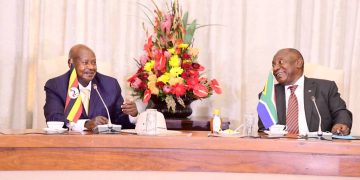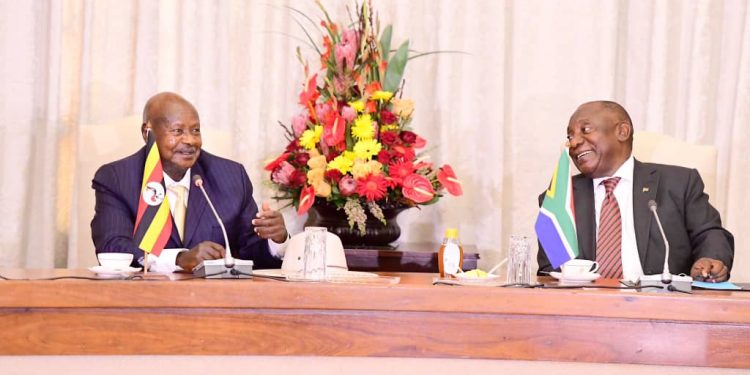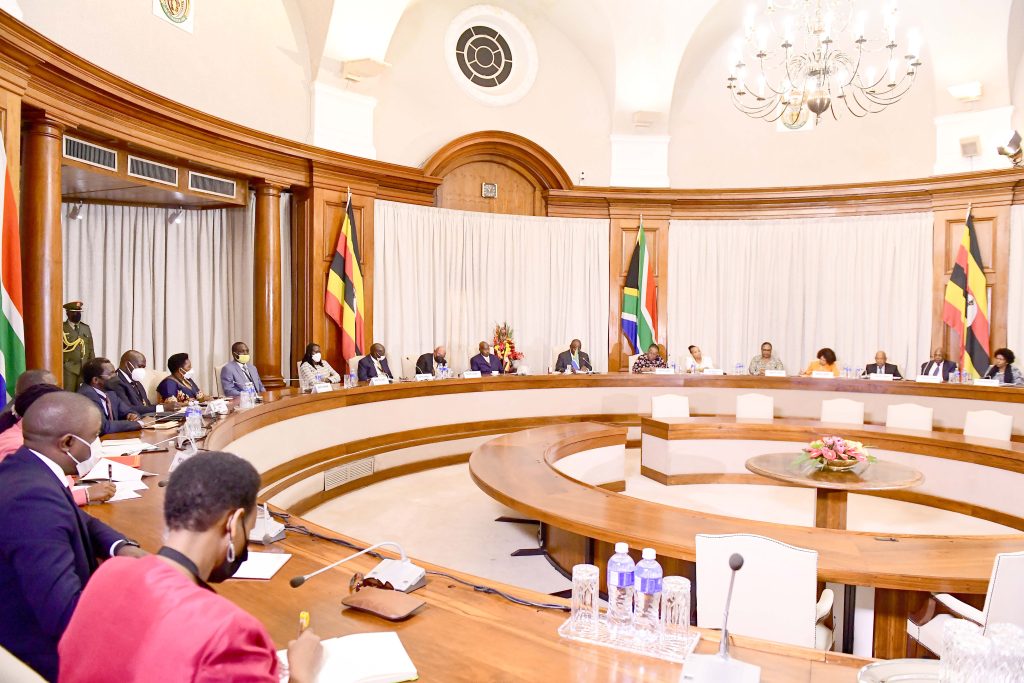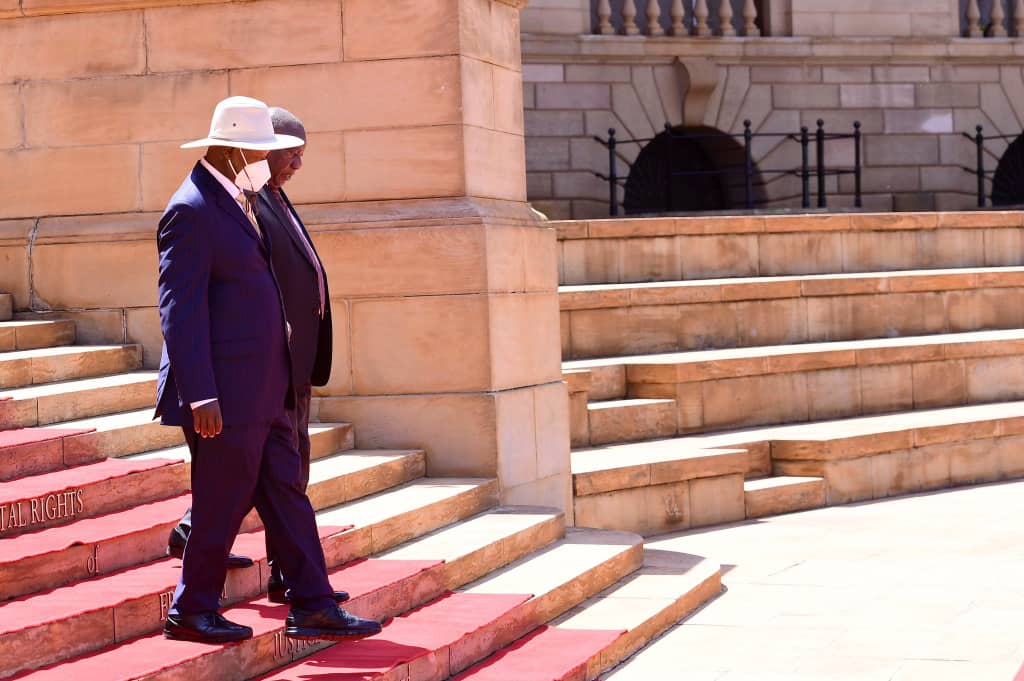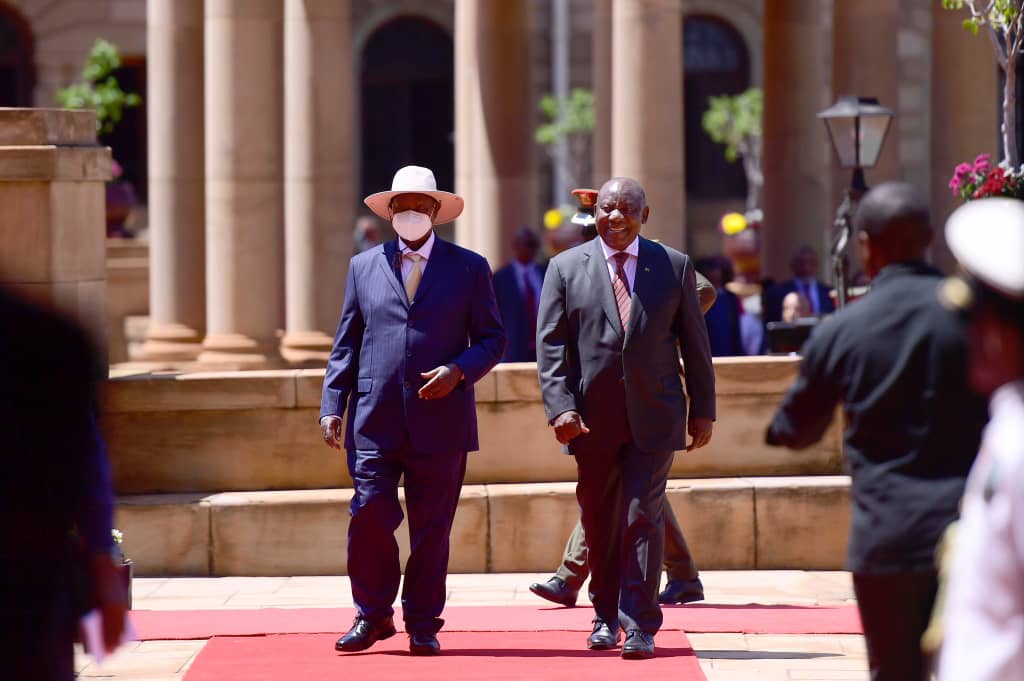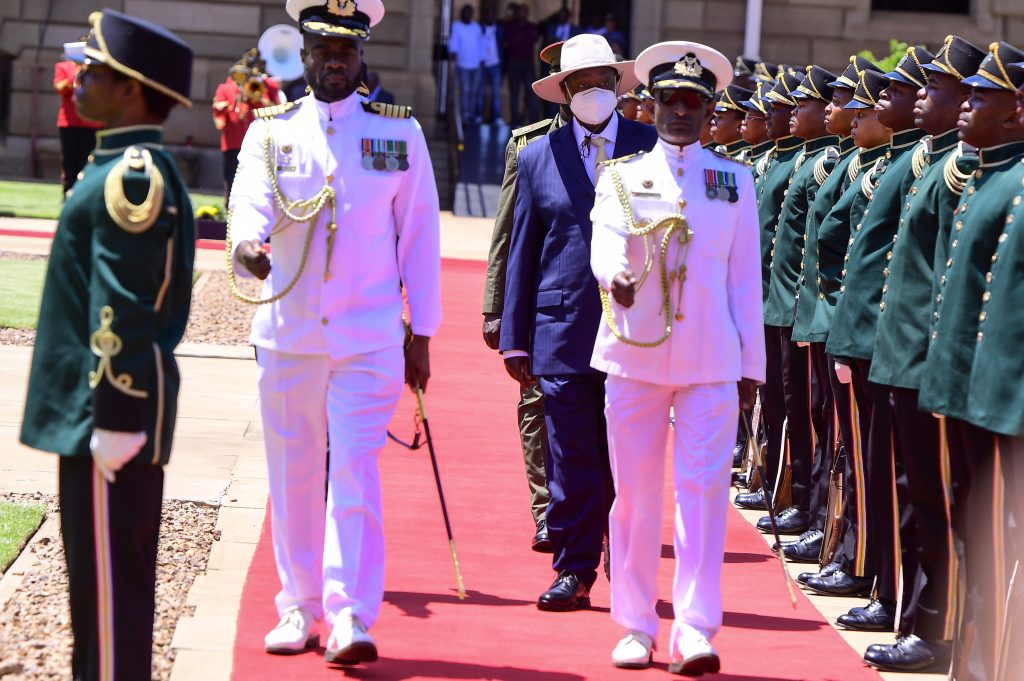At the invitation of H.E Matamela Cyril Ramaphosa, President of the Republic of South Africa, H.E Mr. Yoweri Museveni, President of the Republic of Uganda, paid a State Visit to the Republic of South Africa on 28th February 2023.
The purpose of the visit was to review and strengthen the current state of bilateral relations and evaluate progress made in the implementation of agreed areas of cooperation whilst exploring cooperation in other areas of mutual interest.
President Ramaphosa was supported by the Minister of International Relations and Cooperation; Trade, Industry and Competition; Public Enterprises; Agriculture, Land Reform and Rural Development; Mineral Resources and Energy; Transport; Tourism; Home Affairs; Defence and Military Veterans; and Women, Youth and Persons with Disabilities.
President Museveni led a high-level delegation from Uganda, which included the Ministers of Foreign Affairs; Finance, Planning and Economic Development; Energy and Mineral Development; Agriculture, Animal Industry and Fisheries; Trade, Industry and Cooperatives; Works and Transport; and Tourism, Wildlife and Antiquities.
South Africa and Uganda established formal diplomatic relations on 24 June 1994 and bilateral relations are managed through the Joint Commission for Cooperation (JCC), the second session of which was successfully held in Kampala in July 2022.

The State Visit was preceded by Political Consultations between the Minister of International Relations and Cooperation of the Republic of South Africa, Dr. GNM Pandor, and Minister of Foreign Affairs of the Republic of Uganda, General Odongo Jeje Abubakhar on 27 February 2023.
The Ministers engaged on bilateral and multilateral issues of mutual interest and received the report of the Senior Officials’ Meeting (SOM), on progress on the implementation of decisions of the JCC.
Presidents Ramaphosa and Museveni expressed their fervent desire to continue to strengthen relations between the two countries.
Deliberations between the two Heads of State focused on bilateral, regional and international issues of mutual interest.
The two Presidents furthermore hailed the historic, warm and friendly relations that exist between the two countries and emphasised the need to continue working jointly towards enhancing political, economic and social cooperation.
President Ramaphosa and President Museveni witnessed the signing of the following Memoranda of Understanding (MOUs): MOU on Cooperation in the Fields of Women, Youth and Persons with Disabilities, MOU on Cooperation in Tourism, MOU on Cooperation in the Field of Correctional Services and Prisons, MOU on Cooperation in Transport-Related Matters and MOU on Cooperation in the Field of Information and Communication Technologies.
President Ramaphosa highlighted that while economic relations between the two countries have grown over the years, South Africa is concerned over the decline in the number of South African businesses operating in Uganda.
In this regard, the Heads of State gave a firm commitment to resolving any challenges experienced by the private sector in both countries.
The Heads of State requested the Ministers responsible for Trade and Foreign Affairs of the respective countries, to urgently put in place a mechanism, to address these challenges and ensure the protection of investments.
The Presidents resolved that the mechanism will also enable the business community of South Africa and Uganda, to take advantage of the vast economic opportunities between the two countries, including those presented through the Agreement on the African Continental Free Trade Area (AFCFTA) and the Tripartite Free Trade Area (TFTA) between the South African Development Community (SADC), the Common Market for East and Southern Africa (COMESA) and the East African Community (EAC).
They noted with much concern, that the TFTA is yet to come into force as it is short of three (3) ratifications to reach the required fourteen ratifications for its operationalisation.
In this regard, they called on the Member States in the Southern African and East African regions that have not ratified the TFTA to urgently do so.
President Ramaphosa expressed South Africa’s gratitude to President Museveni for Uganda’s steadfast support to Eskom in its operations in Uganda since 2003.
Eskom’s very successful 20-year concession, which ends on 31 March 2023, symbolises the strong economic relations between South Africa and Uganda.
In response, H.E. President Museveni of the Republic of Uganda assured South Africa that Eskom’s exit on 31 March 2023 would be managed amicably to allow smooth repatriation of Eskom’s assets.
The Heads of State participated in the Business Forum held at Gallagher Estate on 27 and 28 February 2023, under the theme “Boosting Trade and Investment Relations between South Africa and Uganda” consisting of the private sectors of South Africa and Uganda as well as State Owned Entities.
Participants were provided with the opportunity to share information and experiences in the business environment and opportunities in their sectors and explore concrete proposals and projects for trade and investment in both countries.
The two Presidents reflected on issues affecting the Southern and East African regions. Among others, discussions focused on the latest developments in the Democratic Republic of the Congo (DRC), Ethiopia, and South Sudan.
On the situation in the DRC, the Heads of State commended the efforts deployed by the Southern African Development Community (SADC) and the East African Community (EAC).
They underscored the commitment to support the implementation of the outcomes of the Nairobi and Luanda peace initiatives.
They further welcomed the communique of the meeting of the AU Peace and Security Council (PSC) held on 17th February 2023, which amongst others, called for all armed groups, particularly the M23, as well as the Allied Democratic Forces (ADF) and the Democratic Forces for the Liberation of Rwanda (FDLR), to immediately cease hostilities and unconditionally withdraw from the eastern DRC.
In this regard, the Presidents called for harmonisation and coordination of all efforts aimed at stabilising the DRC.
On Ethiopia, the Presidents were encouraged by progress registered in the implementation of the Agreement on the Permanent Cessation of Hostilities between the Government of the Federal of the Democratic Republic of Ethiopia (FDRE) and the Tigray People’s Liberation Front (TPFL).
They stated that the signing of the Agreement is proof that African solutions to African problems can work, where there is political will. They called on continued support to the people of Ethiopia to ensure that sustainable peace and security are attained.
On South Sudan, the Heads of State reaffirmed the importance of the full implementation of the Revitalised Agreement on the Resolution of Conflict in the Republic of South Sudan (R-ARCSS), as the Agreement remains the best hope for the people of South Sudan to ultimately attain peace.
The Presidents also deliberated on continental and international issues of mutual concern and managed to reach a consensus on many issues. They expressed the need to protect the philosophy and core values of the African Union (AU), which is anchored on the principles of Pan-Africanism.
They also asserted the critical need to maintain focus on the objectives set out in Agenda 2063, towards the realisation of the “Africa that we Want”, by advancing the African Agenda. They emphasised the need to strengthen the management and governance structures of the AU Commission.
The Heads of State recalled that this year marks thirty-two (32) years since the United Nations (UN) Security Council Resolution 690 of 1991, which made provision for an UN-supervised referendum that would allow the Saharawi people to determine their own destiny.
Within this context, they reaffirmed the two countries’ solidarity with the people of Western Sahara and reiterated their call for the implementation of AU decisions and UN resolutions on the holding of the referendum.
Regarding Palestine, the Presidents reasserted their solidarity with the people of Palestine and agreed that the outstanding final status issues, must be resolved through direct negotiations between the parties, in line with all relevant UN resolutions, international law and within internationally agreed parameters.
On the granting of observer status to Israel at the AU, by the Chairperson of the AU Commission, they welcomed the decision of the Assembly of the AU taken during the Summit held on 18 and 19 February 2023, to establish an Ad-Hoc Committee of Heads of State and Government to consult on the matter and provide a report to the next Summit.
On the Russia-Ukraine conflict, President Ramaphosa restated South Africa’s position of non-alignment. The Heads of State encouraged political dialogue between the parties as a way to find a sustainable resolution to the conflict.
The Heads of State expressed their concern over the humanitarian situation and reiterated the call for the urgent provision of aid to the civilian population.
On the reform of the UN Security Council, H.E. President Ramaphosa restated South Africa’s position that the current outdated composition of the Security Council and lack of permanent representation by Africa are unsustainable.
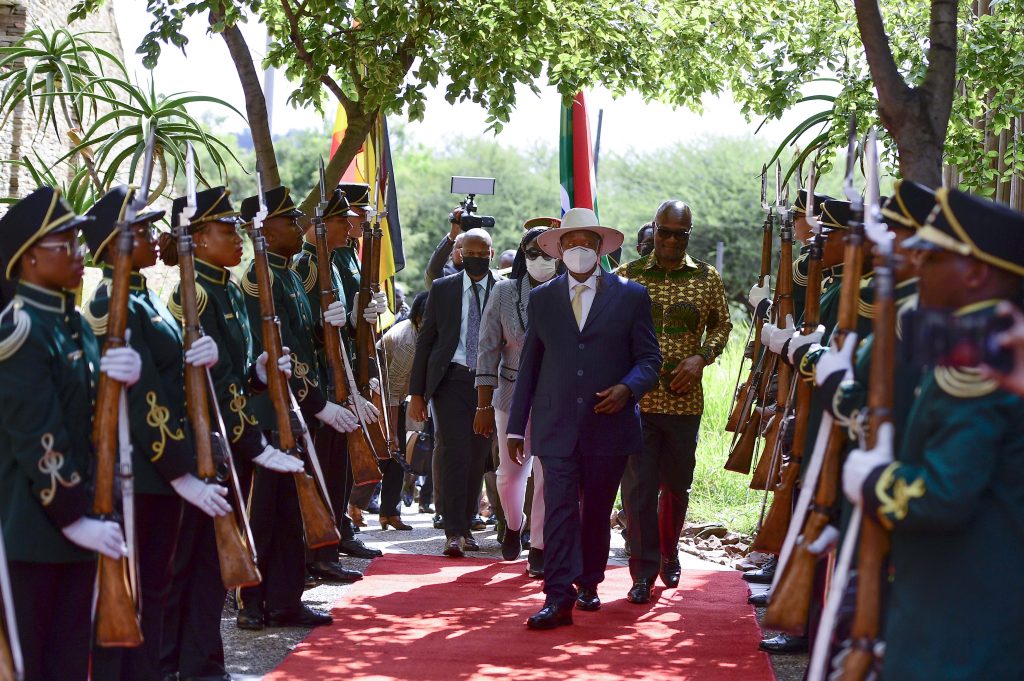
To this effect, the Presidents agreed that for the Security Council to remain relevant and legitimate, it must be reformed as a matter of urgency to reflect the current global realities. They further reaffirmed their support for the Common African Position, known as the Ezulwini Consensus, and the Sirte Declaration, which calls for not less than two permanent seats, with all the privileges including the right of veto, and five non-permanent seats.
President Ramaphosa congratulated H.E President Museveni on Uganda’s nomination as the incoming Chair of the Non-Aligned Movement (NAM) and the Group of 77 (G77) and assured him of South Africa’s support during Uganda’s chair of NAM and the G77.
H.E. President Ramaphosa expressed his satisfaction that the NAM chair is returning to the African Continent in view of the fact that most NAM members are from the Continent. The Heads of State acknowledged that Uganda’s chairing will provide an ideal opportunity to revitalise the NAM to ensure that it is able to play a key role in pursuing the interests of developing countries.
H.E. President Museveni expressed profound gratitude to President Ramaphosa, the Government, and the people of South Africa for the warm reception and generous hospitality extended to him and his delegation.
H.E. President Museveni extended an invitation to President Ramaphosa to visit Uganda, on dates to be agreed upon and communicated through diplomatic channels.
H.E President Ramaphosa thanked H.E President Museveni for undertaking the State Visit to the Republic of South Africa and conveyed best wishes of peace stability and prosperity to the Government and the people of the Republic of Uganda.
